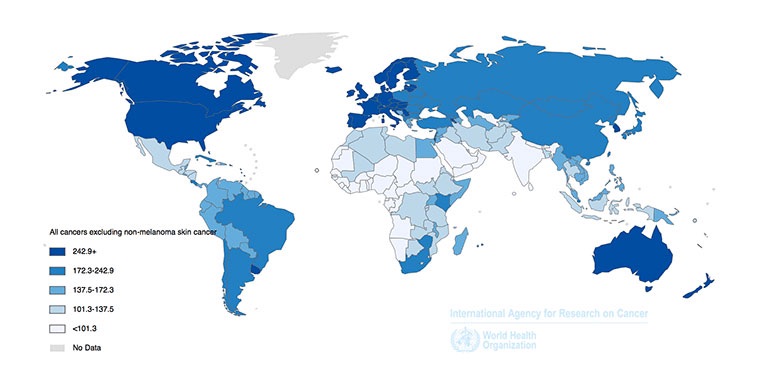World Cancer Day 2011: New physical activity guidance can help prevent breast, colon cancers
04. 02. 2011 | IARC Press ReleaseThe world can do more to stop people suffering and dying from cancer, such as embracing measures, including new physical activity guidance, that can prevent one-third of the annual 7.6 million cancer deaths as well as providing better services for early detection and treatment of cancer [1].
Image credit: shutterstock.com
On World Cancer Day 2011, the world's cancer control community is joining forces to promote the wide range of preventive measures that can reduce millions of cases annually. The World Health Organization's new Global Recommendations on Physical Activity for Health [2] advise that people of all ages can reduce the risk of developing a NCD, including breast and colon cancers, by undertaking various amounts and intensities of physical activity. Almost 460,000 females died from breast cancer in 2008, while close to 610,000 males and females died from colorectal cancer [1].
"Physical activity has a strong role to play in reducing the incidence of certain cancers," says Dr Ala Alwan, WHO's Assistant Director-General for Noncommunicable Diseases and Mental Health. "Physical inactivity is the fourth leading risk factor for all global deaths, with 31% of the world's population not physically active."
For example, at least 150 minutes of moderate intensity aerobic physical activity throughout the week for all people aged 18 and over can reduce the risk of NCDs. For 5-17 year-olds, at least 60 minutes of moderate to vigorous intensity physical activity can protect their health and, in turn, prevent the development of NCDs.
Physical inactivity is also increasing in many countries and has major implications for health and the prevalence of NCDs, such as causing:
- 3.2 million deaths per year, including 2.6 million in low- and middle-income countries.
- Over 670,000 premature deaths (people aged under 60 years).
- Around 30% of diabetes and ischaemic heart disease.
World Cancer Day, initiated in 2005 by the Union for International Cancer Control (UICC), is a key opportunity to highlight the importance of the 19-20 September, 2011, United Nations General Assembly High-level Meeting on the Prevention and Control of cancers and the three other deadliest types of NCDs (cardiovascular diseases, chronic respiratory diseases and diabetes). These four NCDs cause more than 60% of all global deaths, equivalent to more than 35 million annually.
Dr Eduardo Cazap, President of the UICC, says: "The UN NCDs summit is a historic opportunity to establish governmental commitment towards implementing programs which will prevent millions of people suffering and dying from cancer and other chronic diseases. NCDs are dramatically increasing, particularly in developing countries where nearly 80% of deaths occur. Sadly, changing ways of life, such as reduced physical activity, are making people unhealthier and, in turn, prone to such diseases as cancer."
One area the international community must place extra attention is in the area of research into the causes of cancer. The International Agency for Research on Cancer (IARC), the specialized cancer agency of WHO, is leading efforts into studying cancer risk factors, including physical inactivity.
Professor Chris Wild, Director of IARC, says: "Physical inactivity is one risk factor for noncommunicable diseases which can be modified and therefore is of great potential public health significance. Changing the level of physical activity raises challenges, for the individual but also at societal level, that are now important to address." Worldwide, lung, breast, stomach, liver and colorectal cancers cause the most cancer deaths each year. The majority of all cancer deaths occurred in less developed regions in 2008 and this is expected to increase in coming decades without action.
Reference
- IARC Globocan 2008. International Agency for Research on Cancer, 2010.
- Global recommendations on physical activity for health. Geneva, World Health Organization, 2010.
klíčová slova: World Cancer Day, physical activity, cancer prevention, World Health Organization, International Agency for Research on Cancer, Union for International Cancer Control




